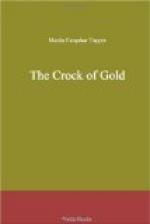The court was still as death, except for sobbing; the jury were doubting and confounded; in vain Mr. Jennings, looking at the foreman, shook his head and stroked his chin in an incredulous and knowing manner; clearly they must retire, not at all agreed; and the judge himself, that masqued man in flowing wig and ermine, but still warmed by human sympathies, struck a tear from his wrinkled cheek; and all seemed to be involuntarily waiting (for the jury, though unable to decide, had not yet left their box), to see whether any sudden miracle would happen to save a man whom evidence made so guilty, and yet he bore upon his open brow the genuine signature of Innocence.
“Silence, there, silence! you can’t get in; there’s no room for’ards!” But a couple of javelin-men at the door were knocked down right and left, and through the dense and suffocating crowd, a black-whiskered fellow, elbowing his way against their faces, spite of all obstruction, struggled to the front behind the bar. Then, breathless with gigantic exertion (it was like a mammoth treading down the cedars), he roared out,
“Judge, swear me, I’m a witness; huzza! it’s not too late.”
And the irreverent gentleman tossed a fur cap right up to the skylight.
CHAPTER XLVI.
THE WITNESS.
MR. GRANTLY brightened up at once, Grace looked happily to Heaven, and Roger Acton shouted out,
“Thank God! thank God!—there’s Ben Burke!”
Yes, he had heard miles away of his friend’s danger about an old shawl and a honey-pot full of gold, and he had made all speed, with Tom in his train, to come and bear witness to the innocence of Roger. The sensation in court, as may be well conceived, was thrilling; but a vociferous crier, and the deep anxiety to hear this sturdy witness, soon reduced all again to silence.
Then did they swear Benjamin Burke, who, to the scandal of his cause, would insist upon stating his profession to be “poacher;” and at first, poor simple fellow, seemed to have a notion that a sworn witness meant one who swore continually; but he was soon convinced otherwise, and his whole demeanour gradually became as polite and deferent as his coarse nature would allow. And Ben told his adventure on Pike island, as we have heard him tell it, pretty much in the same words, for the judge and Mr. Grantly let him take his own courses; and then he added (with a characteristic expletive, which we may as well omit, seeing it occasioned a cry of “order” in the court), “There, if that there white-livered little villain warn’t the chap that brought the crocks, my name an’t Ben Burke.”
“Good Heavens! Mr. Jennings, what’s the matter?” said a briefless one, starting up: this was Mr. Sharp, a personage on former occasions distinguished highly as a thieves’ advocate, but now, unfortunately, out of work. “Loosen his cravat, some one there; the gentleman is in fits.”




